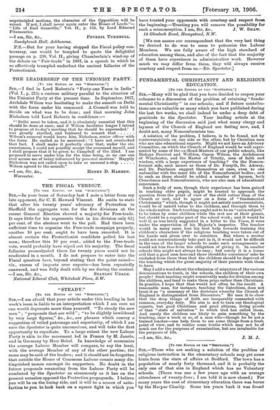FUNDAMENTAL CHRISTIANITY AND RELIGIOUS EDUCATION.
[TO THE EDITOR OF THE "SPECTATOR.] SIR,—Many will be glad that you have,decided to reopen your columns to a discussion of the problem of retaining "funda- mental Christianity" in our schools ; and if future contribu- tions are as valuable as many which you have published during the last few weeks, we shall indeed be under a deep debt of gratitude to the Spectator. Your leading article at the, beginning of the discussion said just what many clergy and laymen of the Church of England are feeling now, and, I
doubt not, many Nonconformists too.
A solution of the problem, I believe, is to be found, not by controversialists on one side or the other, but by Christian men who are also educational experts. Might we not have an Advisory Committee, on which the Church of England would be well repre- sented by some of the ex-Head-Masters of our public schools, like Bishops Percival and Welidon, Canon Wilson, the Archdeacon of Winchester, and the Master of Trinity, men of faith and wisdom, with a large experience of teaching ? On the Noncon- formist side, such names as those of Dr. Forsyth, Dr. Adeney, and Dr. Fairbairn suggest themselves at once, even to one unfamiliar with the inner life of the Nonconformist bodies; and to such as these should be added a number of laymen, both Churchmen and Nonconformists, who are also men of educational experience.
Such a body of men, though their experience has been gained in teaching older pupils, might be trusted to approach the question from the point of view of the child rather than of the Church or sect, and to agree on a form of " fundamental Christianity" which, though it might not satisfy controversialists, would be of untold value to the children, and through them to the whole nation. Such teaching ought not to be an "extra subject," to be taken by some children while the rest are at their games, but should be a regular part of the school work; and it would be well if, as was lately suggested in a letter to the Times, it were under the supervision of his Majesty's inspector. The teacher would in many cases lose his best help towards training the children's characters if the religions teaching were taken out of his hands and given over to outsiders. But where a master could not conscientiously take part in it, it would not be difficult in the case of the larger schools to make such arrangements as would set him free from the obligation of giving it. In smaller schools this might not always be easy ; but surely it is a lesser evil that a good man here and there should for conscience' sake be excluded from these than that the children should be deprived of the teaching which the great majority of their parents wish them to have.
May I add a word about the admission of ministers of the various denominations to teach, in the schools, the children of their own people? Such teaching might conceivably make for division among the children, and tend to make them prigs rather than Christians. In practice, I hope that that would not often be the result. A reasonable man, for instance, teaching the Catechism, does not treat it as "a summary of the doctrines whereby the Church of England is distinguished from Dissenters." He uses it to show that the deep things of faith are inseparably connected with common, everyday duty. His aim is not to turn out theological experts, but good Christians and good citizens, living proofs of that "state of salvation" to which God has called them. And surely the children are likely to gain something by the teaching, once a week or so, of a man who—though he be not a trained teacher—can help them to see some things from a fresh point of view, and to realise some truths which may not be of much use for the purposes of examination, but are invaluable for the purposes of life.










































 Previous page
Previous page